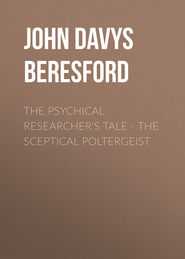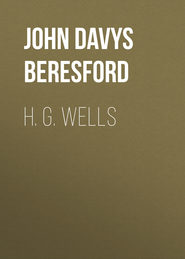По всем вопросам обращайтесь на: info@litportal.ru
(©) 2003-2024.
✖
The Jervaise Comedy
Автор
Год написания книги
2018
Настройки чтения
Размер шрифта
Высота строк
Поля
“I haven’t the least notion what it is, you see,” I apologised.
“Oh! it’s about old Mr. Jervaise,” Anne explained without the least show of reluctance. “There’s some woman or other he goes to see in town. And once or twice Arthur took him in the car. They forget we’re human beings at all, sometimes, you know. They think we’re just servants and don’t notice things; or if we do notice them, that we shouldn’t be so disrespectful as to say anything. I don’t know what they think. Anyhow, he let Arthur drive him—twice, I believe it was—and the second time Arthur looked at him when he came out of the house, and Mr. Jervaise must have known that Arthur guessed. Nothing was said, of course, but he didn’t ever take Arthur again; but Arthur knows the woman’s name and address. It was in some flats, and the porter told him something, too.”
I realised that I had wasted my sympathy on old Jervaise. His air of a criminal awaiting arrest had been more truly indicative than I could have imagined possible. He had been expecting blackmail; had probably been willing to pay almost any price to avoid the scandal. I wondered how far the morning interview had relieved his mind?
“That explains Mr. Jervaise’s state of nerves this morning,” I remarked. “I could see that he was frightfully upset, but I thought it was about Brenda. I had an idea that he might be very devoted to her.”
Anne pushed that aside with a gesture, as quite unworthy of comment.
“But, surely, that really does give your brother some kind of advantage,” I went on thoughtlessly. I suppose that I was too intent on keeping Anne in England to understand exactly what my speech implied.
She looked at me with a superb scorn. “You don’t mean to say,” she said, “that you think we’d take advantage of a thing like that? Father—or any of us?”
I had almost the same sense of being unjustly in disgrace that I had had during the Hall luncheon party. I do not quite know what made me grasp at the hint of an omission from her bravely delivered “any of us.” I was probably snatching at any straw.
“Your mother would feel like that, too?” I dared in my extremity.
Any ordinary person would have parried that question by a semblance of indignation or by asking what I meant by it. Anne made no attempt to disguise the fact that the question had been justified. Her scorn gave way to a look of perplexity; and when she spoke she was staring out of the window again, as if she sought the spirit of ultimate truth on some, to me, invisible horizon.
“She isn’t practical,” was Anne’s excuse for her mother. “She’s so—so romantic.”
“I’m afraid I was being unpractical and romantic, too,” I apologised, rejoicing in my ability to make use of the precedent.
Anne just perceptibly pursed her lips, and her eyes turned towards me with the beginning of a smile.
“You little thought what a romance you were coming into when you accepted the invitation for that week-end—did you?” she asked.
“My goodness!” was all the comment I could find; but I put a world of feeling into it.
“And I very nearly refused,” I went on, with the excitement of one who makes a thrilling announcement.
Anne humoured my eagerness with a tolerant smile. “Did you?” she said encouragingly.
“It was the merest chance that I accepted,” I replied. “I was curious about the Jervaise family.”
“Satisfied?” Anne asked.
“Well, I’ve been given an opportunity of knowing them from the inside,” I said.
“You’ll be writing a play about us,” Anne remarked carelessly.
I was astonished to find that she knew I had written plays. “How did you know that I did that sort of thing?” I asked.
“I’ve seen one of them,” she said. “’The Mulberry Bush’; when mother and I were in London last winter. And Arthur said you were the same Mr. Melhuish. I suppose Frank Jervaise had told him.”
“People who go to the theatre don’t generally notice the name of the author,” I commented.
“I do,” she said. “I’m interested in the theatre. I’ve read dozens of plays, in French, mostly. I don’t think the English comedies are nearly so well done. Of course, the French have only one subject, but they are so much more witty. Have you ever read Les Hannetons, for instance?”
“No. I’ve seen the English version on the stage,” I said.
I was ashamed of having written The Mulberry Bush, of having presumed to write any comedy. I felt the justice of her implied criticism. Indeed, all my efforts seemed to me, just then, as being worthless and insincere. All my life, even. There was something definite and keen about this girl of twenty-three that suddenly illuminated my intellectual and moral flabbiness. She had already a definite attitude towards social questions that I had never bothered to investigate. She had shown herself to have a final pride in the matter of blackmailing old Jervaise. And in half a dozen words she had exposed the lack of real wit in my attempts at playwriting. I was humbled before her superior intelligence. Her speech had still a faint flavour of the uneducated, but her judgments were brilliantly incisive; despite her inferentially limited experience, she had a clearer sight of humanity than I had.
“You needn’t look so depressed,” she remarked.
“I was thinking what a pity it is that you should go to Canada,” I returned.
“I want to go,” she said. “I want to feel free and independent; not a chattel of the Jervaises.”
“But—Canada!” I remonstrated.
“You see,” she said, “I could never leave my father and mother. Wherever they go, I must go, too. They’ve no one but me to look after them. And this does, at last, seem, in a way, a chance. Only, I can’t trust myself. I’m too impulsive about things like this. Oh! do you think it might kill my father if he were torn up by the roots? Sometimes I think it might be good for him, and at others I’m horribly afraid.”
“Well, of course, I’ve never seen him…” I began.
“And in any case, you’re prejudiced,” she interrupted me. Her tone had changed again; it was suddenly light, almost coquettish, and she looked at me with a challenging lift of her eyebrows, as if, most astonishingly, she had read my secret adoration of her and defied me to acknowledge it.
“In what way am I prejudiced?” I asked.
“Hush! here’s Brenda coming back,” she said.
I regretted extremely that Brenda should have returned at that moment, but I was tremendously encouraged. Anne seemed in that one sentence to have sanctioned the understanding that I was in love with her. Her warning of the interruption seemed to carry some unspoken promise that I should be given another opportunity.
XII
Conversion
Anne had not once moved from her original place by the table in the course of that long conversation of ours, and she still stood there, her finger-tips resting on the oak with a powerful effect of poise when Brenda came into the room.
Brenda’s actions were far more vivacious than her friend’s. She came in with an air of youthful exuberance, looked at me with a shade of inquiry, and then sat down opposite Anne.
“I came back over the hill and through the wood,” she said, resting her elbows on the table and her chin on her hands. “It’s a topping evening. Poor Arthur; I wish I could have gone with him. I offered to, but he didn’t want me to come. I’m not sure he didn’t think they might kidnap me if I went too near.” She turned to me with a bright smile as she added, “Could they keep me, Mr. Melhuish; shut me up or something?”
“I’m not quite sure about that,” I said, “but they could arrest—Arthur”—(I could not call him anything else, I found)—“if he ran away with you. On a charge of abduction, you know.”
“They could make it pretty nasty for us all round, in fact,” Brenda concluded.
“I’m afraid they could,” I agreed.
She was looking extraordinarily pretty. The bizarre contrast between her dark eyelashes and her fair hair seemed to find some kind of echo in the combination of health and fragility that she expressed in her movements. She appeared at once vital and delicate without being too highly-strung. I could well understand how the bucolic strain in Arthur Banks was prostrate with admiration before such a rare and exciting beauty.
By the side of Brenda, Anne looked physically robust. The developed lines of her figure emphasised Brenda’s fragility. And yet Anne’s eyes, her whole pose, expressed a spirituality that Brenda lacked. Anne, with her amazing changes of mood, her rapid response to emotion, gave expression to some spirit not less feminine than Brenda’s, but infinitely deeper. Behind the moving shadows and sunlight of her impulses there lay always some reminder of a constant orientation. She might trifle brilliantly with the surface of life, but her soul was more steadfast than a star. Brenda might love passionately, but her love would be relatively personal, selfish. When Anne gave herself, she would love like a mother, with her whole being.
I came out of my day-dream to find that she was speaking of me.
“Mr. Melhuish is half asleep,” she was saying. “And I haven’t got his room ready after all this time.”
“He didn’t get much sleep last night,” Brenda replied. “We none of us did for that matter. We were wandering round the Park and just missing each other like the people in A Midsummer Night’s Dream.”
“Oh! it’s about old Mr. Jervaise,” Anne explained without the least show of reluctance. “There’s some woman or other he goes to see in town. And once or twice Arthur took him in the car. They forget we’re human beings at all, sometimes, you know. They think we’re just servants and don’t notice things; or if we do notice them, that we shouldn’t be so disrespectful as to say anything. I don’t know what they think. Anyhow, he let Arthur drive him—twice, I believe it was—and the second time Arthur looked at him when he came out of the house, and Mr. Jervaise must have known that Arthur guessed. Nothing was said, of course, but he didn’t ever take Arthur again; but Arthur knows the woman’s name and address. It was in some flats, and the porter told him something, too.”
I realised that I had wasted my sympathy on old Jervaise. His air of a criminal awaiting arrest had been more truly indicative than I could have imagined possible. He had been expecting blackmail; had probably been willing to pay almost any price to avoid the scandal. I wondered how far the morning interview had relieved his mind?
“That explains Mr. Jervaise’s state of nerves this morning,” I remarked. “I could see that he was frightfully upset, but I thought it was about Brenda. I had an idea that he might be very devoted to her.”
Anne pushed that aside with a gesture, as quite unworthy of comment.
“But, surely, that really does give your brother some kind of advantage,” I went on thoughtlessly. I suppose that I was too intent on keeping Anne in England to understand exactly what my speech implied.
She looked at me with a superb scorn. “You don’t mean to say,” she said, “that you think we’d take advantage of a thing like that? Father—or any of us?”
I had almost the same sense of being unjustly in disgrace that I had had during the Hall luncheon party. I do not quite know what made me grasp at the hint of an omission from her bravely delivered “any of us.” I was probably snatching at any straw.
“Your mother would feel like that, too?” I dared in my extremity.
Any ordinary person would have parried that question by a semblance of indignation or by asking what I meant by it. Anne made no attempt to disguise the fact that the question had been justified. Her scorn gave way to a look of perplexity; and when she spoke she was staring out of the window again, as if she sought the spirit of ultimate truth on some, to me, invisible horizon.
“She isn’t practical,” was Anne’s excuse for her mother. “She’s so—so romantic.”
“I’m afraid I was being unpractical and romantic, too,” I apologised, rejoicing in my ability to make use of the precedent.
Anne just perceptibly pursed her lips, and her eyes turned towards me with the beginning of a smile.
“You little thought what a romance you were coming into when you accepted the invitation for that week-end—did you?” she asked.
“My goodness!” was all the comment I could find; but I put a world of feeling into it.
“And I very nearly refused,” I went on, with the excitement of one who makes a thrilling announcement.
Anne humoured my eagerness with a tolerant smile. “Did you?” she said encouragingly.
“It was the merest chance that I accepted,” I replied. “I was curious about the Jervaise family.”
“Satisfied?” Anne asked.
“Well, I’ve been given an opportunity of knowing them from the inside,” I said.
“You’ll be writing a play about us,” Anne remarked carelessly.
I was astonished to find that she knew I had written plays. “How did you know that I did that sort of thing?” I asked.
“I’ve seen one of them,” she said. “’The Mulberry Bush’; when mother and I were in London last winter. And Arthur said you were the same Mr. Melhuish. I suppose Frank Jervaise had told him.”
“People who go to the theatre don’t generally notice the name of the author,” I commented.
“I do,” she said. “I’m interested in the theatre. I’ve read dozens of plays, in French, mostly. I don’t think the English comedies are nearly so well done. Of course, the French have only one subject, but they are so much more witty. Have you ever read Les Hannetons, for instance?”
“No. I’ve seen the English version on the stage,” I said.
I was ashamed of having written The Mulberry Bush, of having presumed to write any comedy. I felt the justice of her implied criticism. Indeed, all my efforts seemed to me, just then, as being worthless and insincere. All my life, even. There was something definite and keen about this girl of twenty-three that suddenly illuminated my intellectual and moral flabbiness. She had already a definite attitude towards social questions that I had never bothered to investigate. She had shown herself to have a final pride in the matter of blackmailing old Jervaise. And in half a dozen words she had exposed the lack of real wit in my attempts at playwriting. I was humbled before her superior intelligence. Her speech had still a faint flavour of the uneducated, but her judgments were brilliantly incisive; despite her inferentially limited experience, she had a clearer sight of humanity than I had.
“You needn’t look so depressed,” she remarked.
“I was thinking what a pity it is that you should go to Canada,” I returned.
“I want to go,” she said. “I want to feel free and independent; not a chattel of the Jervaises.”
“But—Canada!” I remonstrated.
“You see,” she said, “I could never leave my father and mother. Wherever they go, I must go, too. They’ve no one but me to look after them. And this does, at last, seem, in a way, a chance. Only, I can’t trust myself. I’m too impulsive about things like this. Oh! do you think it might kill my father if he were torn up by the roots? Sometimes I think it might be good for him, and at others I’m horribly afraid.”
“Well, of course, I’ve never seen him…” I began.
“And in any case, you’re prejudiced,” she interrupted me. Her tone had changed again; it was suddenly light, almost coquettish, and she looked at me with a challenging lift of her eyebrows, as if, most astonishingly, she had read my secret adoration of her and defied me to acknowledge it.
“In what way am I prejudiced?” I asked.
“Hush! here’s Brenda coming back,” she said.
I regretted extremely that Brenda should have returned at that moment, but I was tremendously encouraged. Anne seemed in that one sentence to have sanctioned the understanding that I was in love with her. Her warning of the interruption seemed to carry some unspoken promise that I should be given another opportunity.
XII
Conversion
Anne had not once moved from her original place by the table in the course of that long conversation of ours, and she still stood there, her finger-tips resting on the oak with a powerful effect of poise when Brenda came into the room.
Brenda’s actions were far more vivacious than her friend’s. She came in with an air of youthful exuberance, looked at me with a shade of inquiry, and then sat down opposite Anne.
“I came back over the hill and through the wood,” she said, resting her elbows on the table and her chin on her hands. “It’s a topping evening. Poor Arthur; I wish I could have gone with him. I offered to, but he didn’t want me to come. I’m not sure he didn’t think they might kidnap me if I went too near.” She turned to me with a bright smile as she added, “Could they keep me, Mr. Melhuish; shut me up or something?”
“I’m not quite sure about that,” I said, “but they could arrest—Arthur”—(I could not call him anything else, I found)—“if he ran away with you. On a charge of abduction, you know.”
“They could make it pretty nasty for us all round, in fact,” Brenda concluded.
“I’m afraid they could,” I agreed.
She was looking extraordinarily pretty. The bizarre contrast between her dark eyelashes and her fair hair seemed to find some kind of echo in the combination of health and fragility that she expressed in her movements. She appeared at once vital and delicate without being too highly-strung. I could well understand how the bucolic strain in Arthur Banks was prostrate with admiration before such a rare and exciting beauty.
By the side of Brenda, Anne looked physically robust. The developed lines of her figure emphasised Brenda’s fragility. And yet Anne’s eyes, her whole pose, expressed a spirituality that Brenda lacked. Anne, with her amazing changes of mood, her rapid response to emotion, gave expression to some spirit not less feminine than Brenda’s, but infinitely deeper. Behind the moving shadows and sunlight of her impulses there lay always some reminder of a constant orientation. She might trifle brilliantly with the surface of life, but her soul was more steadfast than a star. Brenda might love passionately, but her love would be relatively personal, selfish. When Anne gave herself, she would love like a mother, with her whole being.
I came out of my day-dream to find that she was speaking of me.
“Mr. Melhuish is half asleep,” she was saying. “And I haven’t got his room ready after all this time.”
“He didn’t get much sleep last night,” Brenda replied. “We none of us did for that matter. We were wandering round the Park and just missing each other like the people in A Midsummer Night’s Dream.”








